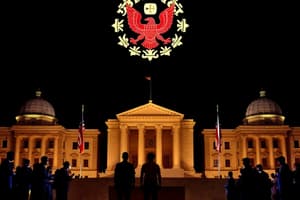Podcast
Questions and Answers
What is the primary function of government in relation to business?
What is the primary function of government in relation to business?
- To regulate and support corporate operations for economic stability (correct)
- To prioritize profits over public welfare
- To ensure complete control over private enterprises
- To eliminate all forms of competition within the market
Which method focuses on understanding the origins and development of political institutions?
Which method focuses on understanding the origins and development of political institutions?
- Analytical Method
- Empirical Method
- Historical Method (correct)
- Comparative Method
What aspect does the Analytical Method specifically evaluate?
What aspect does the Analytical Method specifically evaluate?
- Cultural influences on governmental structures
- The economic implications of state policies
- Legislative processes and their historical context
- The interrelations of political institutions and their performance (correct)
What concept asserts that a government exists only as an agent with delegated power from the people?
What concept asserts that a government exists only as an agent with delegated power from the people?
Which of the following does NOT fall under the government's regulatory function impacting the national economy?
Which of the following does NOT fall under the government's regulatory function impacting the national economy?
What does the Comparative Method allow researchers to analyze?
What does the Comparative Method allow researchers to analyze?
Which theory suggests that the state emerged from individuals seeking self-preservation and security?
Which theory suggests that the state emerged from individuals seeking self-preservation and security?
What is the objective of the legislature in relation to development goals?
What is the objective of the legislature in relation to development goals?
According to the patriarchal theory, the state evolved from which of the following?
According to the patriarchal theory, the state evolved from which of the following?
Which philosopher is considered the 'Father of Political Science'?
Which philosopher is considered the 'Father of Political Science'?
What is the origin of the word 'politics'?
What is the origin of the word 'politics'?
According to Aristotle, what does it mean that 'man by nature is a political being'?
According to Aristotle, what does it mean that 'man by nature is a political being'?
Which theory likens the state to a living organism, emphasizing its capacity for growth and development?
Which theory likens the state to a living organism, emphasizing its capacity for growth and development?
What does the economic theory primarily focus on regarding the development of the state?
What does the economic theory primarily focus on regarding the development of the state?
What is the main premise of the force theory regarding the origin of the state?
What is the main premise of the force theory regarding the origin of the state?
Which method relies heavily on the observation of actual political institutions?
Which method relies heavily on the observation of actual political institutions?
What role does the government play in relation to the expression of the general will of the people?
What role does the government play in relation to the expression of the general will of the people?
How does the Historical Method contribute to political science?
How does the Historical Method contribute to political science?
What is a primary function of the state?
What is a primary function of the state?
Which statement best encapsulates the belief about popular participation in government according to the democratic model?
Which statement best encapsulates the belief about popular participation in government according to the democratic model?
What does political science concern itself with?
What does political science concern itself with?
What is the relationship between politics and social order?
What is the relationship between politics and social order?
What does the term 'sovereign power' refer to in the context of a state?
What does the term 'sovereign power' refer to in the context of a state?
How did Machiavelli contribute to political science?
How did Machiavelli contribute to political science?
What is the primary function of the government within a state?
What is the primary function of the government within a state?
Which of the following is NOT one of the four elements of a state?
Which of the following is NOT one of the four elements of a state?
How is 'common defense' defined as a purpose of the state?
How is 'common defense' defined as a purpose of the state?
What does 'spirit of national unity' refer to in the context of a state?
What does 'spirit of national unity' refer to in the context of a state?
Which aspect of liberty is highlighted within the objectives of a state?
Which aspect of liberty is highlighted within the objectives of a state?
Which of the following best describes social justice as defined in the content?
Which of the following best describes social justice as defined in the content?
What is the significance of geography as one of the elements of a state?
What is the significance of geography as one of the elements of a state?
What role does the government play in promoting public morality?
What role does the government play in promoting public morality?
What best describes the characteristic of sovereignty as being comprehensive?
What best describes the characteristic of sovereignty as being comprehensive?
What does the term 'indivisible' signify in the context of sovereignty?
What does the term 'indivisible' signify in the context of sovereignty?
According to the Code of the National Flag, what is required during the recitation of the Pledge of Alliance to the Philippine Flag?
According to the Code of the National Flag, what is required during the recitation of the Pledge of Alliance to the Philippine Flag?
Which statement does NOT reflect the Declaration of Policy regarding national symbols?
Which statement does NOT reflect the Declaration of Policy regarding national symbols?
What does the national motto 'Makadiyos' signify in the context of the Philippine national ideals?
What does the national motto 'Makadiyos' signify in the context of the Philippine national ideals?
Which of the following is NOT a characteristic of sovereignty?
Which of the following is NOT a characteristic of sovereignty?
What is the title of the national anthem of the Philippines?
What is the title of the national anthem of the Philippines?
How should individuals whose religious beliefs prevent them from making the Pledge of Alliance show respect during its recitation?
How should individuals whose religious beliefs prevent them from making the Pledge of Alliance show respect during its recitation?
Study Notes
Understanding Politics
- Politics comes from the Greek word "Polis" meaning "City-State."
- A city-state is considered a social existence based on rule, authority, or power.
- Aristotle believed man is a political being by nature, with tendencies towards both good and bad.
- Politics can be either good (development goals) or bad (self-advancement).
The State
- The state is the most powerful political organization within a territory, holding sovereign power.
- The state provides a platform for social interaction and promoting the good life by resolving conflicts and setting collective goals.
Importance of Politics
- Politics provides order and maintains a civilized society, preventing anarchy or tyranny.
Political Science
- Political science deals with the theories and practices of a nation's origin, conflicts, and development.
- The government of the state is central to both politics and political science.
Science
- Science is a systematic approach to human knowledge in a specific field of inquiry.
- Science involves observation, theoretical development to explain phenomenon, and constant refinement of theories.
Political Science
- Aristotle is considered the father of political science.
- Aristotle used the city-state as a laboratory for empirical study of political phenomenon.
- Machiavelli expanded the laboratory of political science to the whole world.
Fields of Political Science
- Government, Business, and Economics: Focus on state intervention in economic activity, including welfare states, budget management, and government regulation of businesses.
- Legislatures and Legislation: Focuses on the structure, organization, and role of legislatures in achieving development goals.
Methodological Approaches to Political Science
- Observation/Empirical Method: Observational analysis of political institutions and their processes.
- Historical Method: Investigates the origin and evolution of states to understand its growth and development.
- Comparative Method: Compares political institutions and practices across history and different societies, highlighting similarities and differences.
- Analytical Method: Detailed study of political institutions, focusing on their interrelationships, power dynamics, and relationships with society.
Theories on the Origin of the State
- Social Contract Theory (Jean-Jacques Rousseau): The state is based on an agreement between individuals to form a society and government.
- Force Theory: The state emerged through conquest and coercion by powerful individuals or groups.
- Natural Theory (Aristotle): The state is a natural consequence of human needs and tendencies for social interaction.
- Patriarchal Theory: The state developed from the family unit, expanding gradually to clans, tribes, and nations.
- Instinctive Theory: The natural inclination of humans towards political association led to the creation of the state.
- Economic Theory (Plato): The state arose from the need to satisfy economic wants and facilitate exchange of goods and services.
The Nation-State
- A community of people occupying a defined territory, free from external control, with an organized government that commands the obedience of its inhabitants. (James Garner)
Elements of a State
- People: The inhabitants or population of the state.
- Territory: Land, air, space, water, natural resources, and 12 miles of sea beyond the coastline.
- Geography: Location and physical features.
- Government: Institution responsible for providing services and resolving conflicts.
Crucial Elements of a Nation-State
- Strong sense of national unity, solidarity, and love for the country.
- Common unifying bonds, including emotional, cultural, spiritual, and social connections
Purpose and Objectives of the State
- Common Defense: Maintaining domestic order and tranquility, and defending against external aggression.
- Blessings of Liberty and Justice: Ensuring individual freedoms and rights as well as administering justice.
- Promotion of Public Morality: Promoting the general welfare, providing essential services, and upholding moral standards.
Sovereignty
- The supreme legal authority of the state to enforce its will, using force if necessary.
Characteristics of Sovereignty
- Comprehensive: State has supreme power over everything within its boundaries.
- Indivisible: Sovereignty belongs to the people as a whole.
- Permanent: Exists as long as the state exists, and can't be relinquished.
- Absolute: Not subject to external restrictions.
R.A. No. 8941: Flag and Heraldic Code of the Philippines
- Section 1: Short Title: Known as the "Flag and Heraldic Code of the Philippines."
- Section 2: Declaration of Policy: Promotes respect for the national flag, anthem, and other symbols; emphasizes national pride, reverence for the flag and anthem, and proper use of national symbols.
- Section 25: Pledge of Allegiance to the Philippine Flag: Prescribes the wording and procedure for reciting the pledge. Individuals with religious objections are allowed to stand at attention.
- Section 35 and 36: National Anthem: "Lupang Hinirang" is the national anthem and must be sung in the national language always.
- Section 4: National Motto: "Makadiyos" (God-fearing), "Makatao" (Human-loving), "Makakalikasan" (Nature-loving), and "Makabansa" (Patriotic).
Studying That Suits You
Use AI to generate personalized quizzes and flashcards to suit your learning preferences.
Related Documents
Description
This quiz explores the fundamental concepts of politics, including the origins of the term, the role of the state, and the importance of political science. Delve into the dynamics of authority, power, and social order, while considering Aristotle's views on human nature in relation to political existence.




